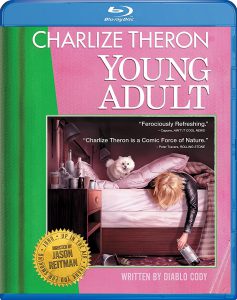“Young Adult” (2011) might be the most depressing movie ever made, but despite that high praise, I have to caution that it’s not for everybody. About a decade ago, I recommended “The Good Girl” (2002) to everyone who would listen, and no one liked it. (It’s about a depressed wife who meets an even-more-depressed younger guy. At one point she says, “I mean I’m depressed but … You are really depressed.” Now that’s my kind of movie.)
But while “The Good Girl” has comedic moments, “Young Adult” isn’t really a comedy, except in the sense that realistic portrayals of humanity are worth a knowing chuckle. Diablo Cody, who wrote the instant classic “Juno” (2007) then slumped a bit with horror-comedy “Jennifer’s Body” (2009), bounces back nicely with a film that piles on the pain yet avoids becoming a drag. It features Mavis Gary (the chameleon-like Charlize Theron), a 37-year-old young-adult fiction writer trapped in a 17-year-old’s mindset (and in some ways, a younger body, because she uses hair extensions, makeup, manicures, sexy dresses; every tool at her disposal), but not in a Tom Hanks or Jennifer Garner sort of way.
Mavis is utterly selfish, traveling from Minneapolis to her hometown of Mercury, Minnesota, to win back her high school sweetheart after getting a baby shower announcement from him. Mavis is utterly oblivious to the notion that what’s right for her isn’t right for other people, even though Matt (Patton Oswalt), the guy whose locker was next to hers in high school, wisely observes her horribly crass attempts to win over a happily married man who has moved on. It’s clear to the viewer that Mavis has a psychological condition, yet she’s also the audience surrogate in many scenes: It’s easy to sympathize with her thinly veiled disgust when she walks through a baby store looking for a gift.
Cody and director Jason Reitman, who also helmed “Juno,” pile up the sad moments. Mavis’ successful book series is about to get canceled; a Mercury bookstore doesn’t want her to sign copies because then they won’t be able to return them to the publisher. We learn that Matt’s legs and private parts were shattered by gay-hating bullies in high school; it was a briefly a national story until the media realized he wasn’t gay; then it was just a fat kid getting beaten up, and not worthy of attention.
The visuals of Mavis driving through Mercury are straightforward, but given “Young Adult’s” context, images of a Staples store, a Champion O’Malley’s sports bar and a “Kentucko Hut” (a KFC, Taco Bell and Pizza Hut in one building) take on a poignant sadness. Even though Mercury is a made-up town, we get it: All this new crap moved in, and it’s not the same place Mavis grew up in. Even though she hated that town too, it’s painful.
Even little things take on an air of sadness. Mavis suggests meeting old flame Buddy (Patrick Wilson) at 8:30 at Woody’s; he suggests 6 at O’Malley’s. She’s gussied up; he’s wearing a flannel shirt spilling breast milk on the kitchen counter.

This is only scratching the surface of the “Oh my god” moments in the film, but suffice it to say that I felt bad for Mavis even as I recognized the wrongness of her behavior. After all, you don’t chastise a teenager for being selfish, you just understand that they haven’t matured.
“Young Adult” digs such a hole, just by portraying how messed up Mavis is, that eventually I realized there was no way the film could dig out of it. And indeed, Cody and Reitman don’t try to; the movie just kind of ends and people’s lives go on. The thing is, “Young Adult” is so observant of human behavior that there’s no way it can reverse course and deliver a cliched ending with a tragic suicide or a beautiful lesson learned.
It’s just about the meanness that’s built into modern civilization, and the realization that you eventually have to give the finger to all the cruelty and go on living.

